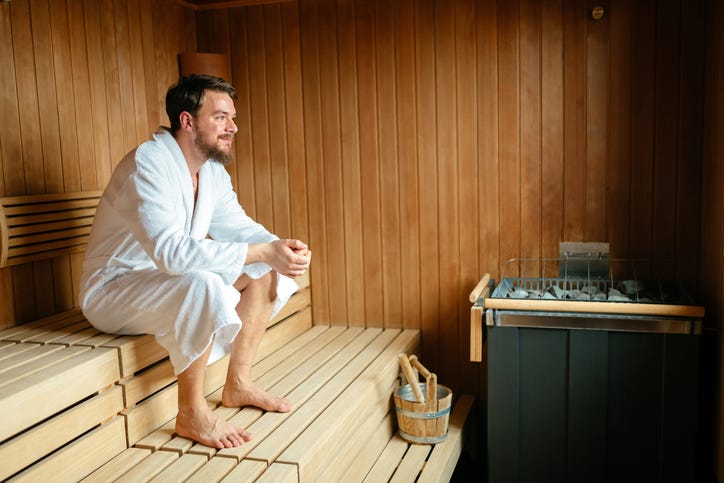What's Good?
Is it a trend? Or is the ad-targeting just getting to me? And other thoughts about this week's food / fitness / technology news...
Happy Friday! What’s good?
As I noted last week, these weekly "What's Good?" newsletters are a chance for me to look through all the stories that have crossed my desk during the week — all the ways in which we're told "what's good" (or what's bad) for us. This week, The New York Times listed "5 Wellness Trends to Watch,” arguing that "a few clear themes have emerged over the first half of the year." I'm less certain that they clearly have! I mean, yes, for sure Ozempic (Trend #1) is everywhere everywhere everywhere in the news, and prescriptions are way up. And I agree (because I am implicated in this), we seem rather obsessed with protein (Trend #5); we're taking a helluva lot of supplements in general (Trend #3), many of which have absolutely no scientific backing but hey. "Therapy" is another wellness trend (Trend #4) apparently, and it does also appear that more Americans are seeking mental health treatment); they’re also seeking "saunas" (Trend #2).
Wait, what? Saunas? This one was totally not on my radar. Like, I have seen no TikToks, no Instagram videos, no People or Us Weekly stories about saunas; I've had no Internet recommendations from friends or follows. And I didn't notice The NYT story on the topic when it first ran back in January, but I wasn’t really looking either, so that’s on me. So maybe it's a thing!

Or maybe it's not, but now it will appear to be because I've clicked around enough online, looking for sauna-related stories, that all the ad-targeting algorithms are going to make sure that all I see for the next few days are offers for bathhouses in the East Village.
Something similar is clearly going on with cottage cheese, which as another NYT story noted this week, has become trendy in part due to a bunch of viral TikTok content. (What a coincidence that I wrote about cottage cheese this week too!) In "How Cooking Videos Took Over the World," Priya Krishna and Umi Syam offer some history of televised cooking shows, before turning their attention to today's "cooking content creators" — what happens when hours-long cooking processes get shortened into 15- or 30-second snippets, and how this in turn shapes what we think of as cooking (and eating).
"The medium is the message," as Marshall McLuhan told us, and (I need to flesh this idea out some more, I realize which is why I’m rambling here rather than writing an essay on the topic just yet) I have been thinking about this in terms of running-related content online too. Running influencer Laura Green made a Instagram reel this week mocking running influencers — the templated tasks that regularly appear in all those "come with me while I run 14 miles!" videos. Of course, a video of someone running 14 miles wouldn't be terribly entertaining. I get it. Even at a brisk 9-minute mile, something like that’d be over 2 hours long. So instead, running influencers showcase other activities — lots of warm-up exercises, in particular. Lots of A-skips and B-skips and various quick little movements to "activate your glutes.” It makes for great, short, shareable content.
You can warm up for a run by just, you know, running. But social media (the medium) is shaping what we think running should entail (the message). Indeed, it’s probably worth thinking about how the rise of modern fitness culture in the early 20th century also coincided with the rise of photography — do we even how to move without looking at pictures of others in motion?
But I digress! (Which is why one should just wait until the end of the year to try to say something profound about trends.) In the meantime, here are some other sports stories, some food news, and a regular dosage of wellness hustle:
From the world of sports and fitness (technology): "5000 steps is the new 10000 steps," says QZ. Slate on "Why Lyft Is Running From Bicycles." "Your Smartwatch May Be Impeding Long-Term Running Goals.” “It’s Livvy Dunne’s World,” says Elle, who says Dunno is the future of gymnastics. Not so fast though. Because Simone Biles is back. “No Wonder Athletes Are Shutting Up About Politics,” writes New York Magazine as conservatives continue to be shitty about the USWNT. Some Big 10 bullshit. Virginia Sole-Smith on “When Diet Culture Comes to Soccer Practice.” “Studying the Limits of Human Perfection, Through Darts.” Something to work towards, I guess: “The New Midlife Fitness Flex: A Pull-Up.” Whatever the opposite of “goals” is: "I Did A Plank Every Day For 120 Days. Here’s What Happened."
Food news: From Eater: "Bring Back Collectible Glasses, You Cowards." Snack Stack with the history of energy drinks of the early 1900s. Radioactive bananas. Amazon’s attempt to do groceries. "According to TikTok, Americans Are Very, Very Thirsty." That said, “You’re Probably Drinking Enough Water.” And this story, on a murderous dinner party in Australia, is kinda wild.
The health and wellness hustle: Fast Company says that psychedelic therapy is a new workplace benefit — at Dr. Bronner's workplace, that is. News from other health companies isn’t so sparkly. Vanity Fair says that “Prince Harry’s Role at BetterUp Critiqued As the Company Falters.” And Headspace seems to be quite an un-chill place to work."No, Creatine (Probably) Doesn’t Cause Hair Loss,” Stronger by Science reassures us.” "What You Should Know About Aspartame” — from Christy Harrison. According to GQ, "New York City’s Mayor Is Something of a Wellness Influencer." “AI is acting ‘pro-anorexia’ and tech companies aren’t stopping it.” “The Hidden Harms of CPR.” A long read from New York Magazine: “How Bessel van der Kolk’s once controversial theory of trauma became the dominant way we make sense of our lives.”
A couple of reminders: tomorrow, I will host the monthly Second Breakfast "chat." Only paid subscribers can participate. (Sorry not sorry.) And starting next week, only paid subscribers will receive all three newsletters from me. A huge thank you to everyone who subscribers — paid or not. But really, thanks to those who do who make it possible for me to spend my days reading and writing about all this stuff by paying for it.





